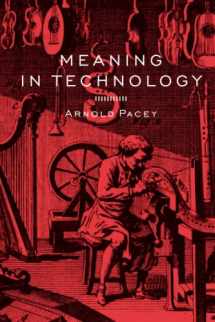
Meaning in Technology
Book details
Summary
Description
In previous books Arnold Pacey has written about the role of ideas and ideals in the creation of technology, about the global history of technology, and about how the complex interaction of political, cultural, economic, and scientific influences determines the course of technological practice. In Meaning in Technology, he explores how an individual's sense of purpose and meaning in life can affect the shape and use of technology. Stressing that there is no hierarchy of meaning in technology, he argues against reductionism in interpreting technology in a human context, and for acknowledgment of the role of the human experience of purpose when it helps to express meaning in technology. In the first part of the book, Pacey analyzes the direct experience of technology by individuals--engineers, mathematicians, craft workers, and consumers. He looks at music as a source of technology, at visual thinking, at tactile knowledge, and at the generation of social meaning. In the second part, he examines the contexts in which technology is used, relating technology to nature and society. He explores our sense of place and of our relationship with nature, environmental concerns, gender, and creativity. He concludes with a discussion of the possibilities of a more people-centered technology--a participatory, ethical experience of technology that values people as well as their environment.


We would LOVE it if you could help us and other readers by reviewing the book
Book review



